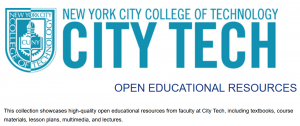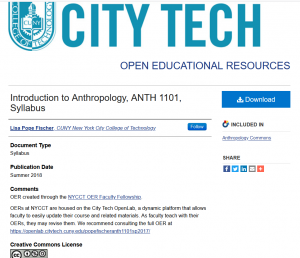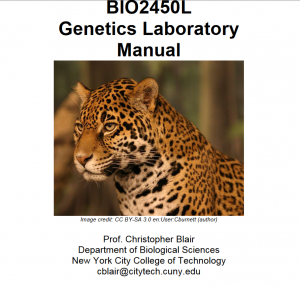New and Noteworthy is the City Tech Library OER Team’s biweekly roundup of new and noteworthy OER. We try to include at least one OER relevant to each school at City Tech in every post. At the end of the month, these resources will be compiled and distributed by the library liaison for your department. Please contact us if you know of new or particularly interesting OER to share with our colleagues or would like more information about OER initiatives at City Tech.
Arts & Sciences
- From Growing to Biology: Plants 1e, by Gokhan Hacisalihoglu, Florida Agricultural and Mechanical University (2021). License: CC BY-NC-SA
“Ready to find out how plants are grown and function? Take a fantastic voyage through plants. From Growing to Biology: Plants 1e brings the latest information for understanding of traditional and modern plant growing, form, and production. Topics covered in 30 chapters include concise and up-to-date ‘big picture’ infographics, student learning outcomes (SLOs), key vocabulary, assessment, as well as identification of 120 species, and more. […] From Growing to Biology: Plants 1e is packed full of horticultural information that is ideal for both academia and industry growers. It is basic enough that if you are just getting started learning plants, you will be able to catch up.” - Language and Culture in Context: A Primer on Intercultural Communication, by Robert Godwin-Jones, Virginia Commonwealth University (2021). License: CC BY-NC.
“The text introduces some of the key concepts in intercultural communication as traditionally presented in (North American) courses and textbooks, namely the study of differences between cultures, as represented in the works and theories of Edward Hall (1959) and Geert Hofstede (1980). Common to these approaches is the prominence of context, leading to a view of human interactions as dynamic and changeable, given the complexity of language and culture, as human agents interact with their environments. […] There is an attempt throughout the text to incorporate views on intercultural communication from a geographically diverse array of scholars, supplementing the author’s North American perspective.”
Professional Studies
- Foundations of Learning and Instructional Design Technology, by Richard E. West, EdTech Books (2018). License: CC BY
“What is this field?” “Where have we come from as a discipline, and where are we going?” “What do I want to study?” These and other questions are typical for new students in the field of Learning and Instructional Design Technology. This textbook is designed to help answer these questions and provide the quickest route to understanding the history and current trends in the field. After surveying classic theories and writings, as well as more recent applications of theory and practice, students will be better prepared to chart their own course and careers within the discipline. This book is designed to support foundations courses common in departments, as well as seminars on current trends and issues.” - Open Judicial Politics, by Rorie Spill Solberg, Jennifer Segal Diascro, and Eric Waltenburg, Oregon State University (2020). License: CC BY-NC-SA
“Open Judicial Politics is a compilation of new and original research in judicial politics, written specifically for the undergraduate audience, thus providing accessible examples of political science research that also address some of the more current concerns and controversies in our field. Additionally, every article is accompanied by some type of classroom activity from basic discussion questions to full-blown simulations that make it easier for instructors to adapt the material to their courses and enhance their courses with interactives.”
Technology & Design
- Defend Dissent, by Glencora Borradaile, Oregon State University (2021). License: CC BY-NC
“Defend Dissent is an introduction to cryptography paired with the social impacts of surveillance and the protective potential of encryption, with a focus on US social movements. Each chapter ends with a story that brings social context to the material—from surveillance used against contemporary US protests to the African National Congress’s use of partially manual encryption in fighting apartheid in South Africa in the 80s.” - Mindful Technical Writing: An Introduction to the Fundamentals, by Dawn Atkinson and Stacey Corbitt, TRAILS (2021). License: CC BY-NC-SA
“Welcome to Mindful Technical Writing: An Introduction to the Fundamentals, an open textbook designed for use in co-requisite course pairings of developmental writing and introductory technical writing, or indeed in other lower-division college writing courses that focus on building study skills alongside effective workplace and academic writing skills. It offers a no-cost alternative to commercial products, combining practical guidance with interactive exercises and thoughtfully designed writing opportunities.”
Cailean Cooney, Assistant Professor, OER Librarian: ccooney@citytech.cuny.edu
Joshua Peach, Adjunct Reference & OER Librarian: jpeach@citytech.cuny.edu
Joanna Thompson, Adjunct OER Librarian: jthompson@citytech.cuny.edu






